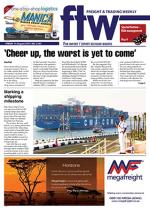National Treasury has
confirmed that it expects to
start implementing carbon
tax by the middle of next year.
“We hope to have the draft
legislation out for comment
within the next two months,”
said Cecil Morden, director:
economic tax analysis:
National Treasury, speaking
at the Special Interest Group
Transport Forum held in
Johannesburg last week.
He told FTW that the
introduction of a carbon
tax was important for three
reasons: raising revenue to
pay for crucial infrastructure
upgrades; reducing road
transport congestion and
reducing toxic carbon
emissions.
Morden said that transport
was responsible for 23%
of world CO2 emissions
from fossil fuel combustion.
“Road transport accounts
for by far the largest part
of CO2 emissions from the
transport sector and this
will remain the case in the
coming decades despite more
rapid growth in shipping and
aviation.”
According to him, rapid
improvement
in the fuel
economy of
light-duty
vehicles and
freight trucks
by about 30%
would reduce
emissions
and could
even stabilise
emissions
from such
vehicles over
the next two
decades.
But what will it cost?
National Treasury is currently
considering a carbon tax at
R120 per ton of CO2 above
the suggested thresholds.
This will be increased by 10%
annually until the 2019/2020
financial year.
Furthermore, there will
be tax thresholds for “trade
exposed sectors’”.
And what about freight
industry buy-in? “The
introduction of a carbon price
will change the relative prices
of goods and
services,
making
emissionintensive
goods more
expensive
relative to
those that are
less emissions
intensive.
This provides
a powerful
incentive for
businesses
to adjust
their behaviour, resulting in
a reduction of emissions,”
commented Morden.
He added that the
proposed design of the carbon
tax tried to address concerns
about the impact of higher
energy prices on low income
households and on the
international competiveness
of South African businesses,
especially in the mining and
manufacturing sectors.
According to Morden,
South Africa can manage
the transition to a
low-carbon economy
without harming jobs or
competitiveness.
Economist Mike Shussler
disagreed with Morden on
this, citing Road Freight
Association calculations that
the proposed carbon tax (on
the previously projected R75
per tonne) was likely to be in
the region of 1.4% of South
Africa’s gross domestic
product (GDP).
He added that there were
other costs that were not
being taken into account,
including a carbon tax on
fuels and cost increases over
time from refineries using
electricity from coal.
“The carbon tax at the
aforementioned rates will
have a definite impact on
economic growth.”
INSERT & CAPTION
Transport is
responsible for 23% of
world CO2 emissions
from fossil fuel
combustion.
– Cecil Morden

